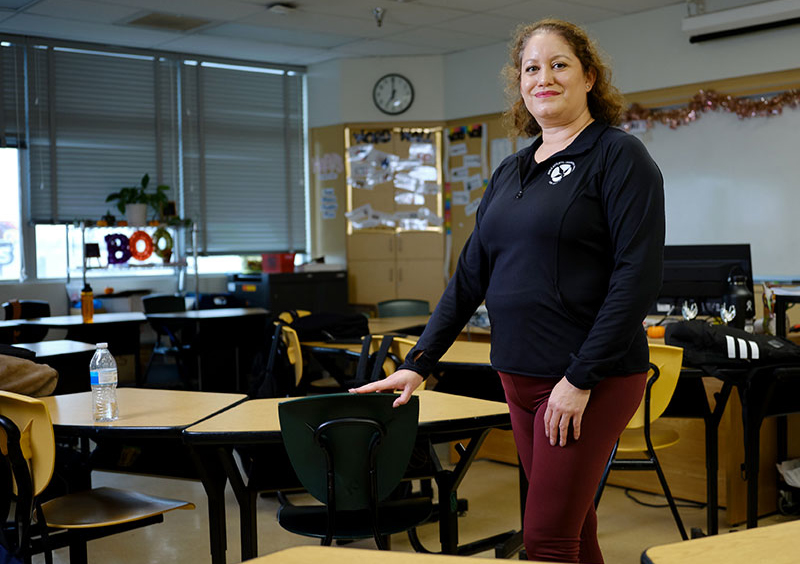
Each morning, the middle school students at the Girls Athletic Leadership School Los Angeles (GALS LA) participate in a school-wide morning workout, then recite a pledge designed to reinforce the tenets of wellness, leadership, community and positive self-image that are integrated into the curriculum. For Vanessa Garza ’10, GALS LA’s founding principal and a graduate of the LMU School of Education’s Charter/Small School Leadership program, the pledge’s first three lines are especially powerful.
I know who I am.
I know that I matter.
I know what matters to me.
As part of the executive leadership team, Garza helped to build Los Angeles’ first all-girls charter middle school, a Title I school located in Panorama City, California. Now in its seventh year, GALS LA goes the extra mile in addressing the physical, emotional, and psychosocial needs of its students. The school’s movement pedagogy stems from the growing body of evidence showing a positive correlation between physical activity and improved cognition, social-emotional awareness, and neurodevelopmental growth. The curriculum also stresses students’ responsibility to their local and global communities.
“It’s so important for girls to receive these lessons before they get to high school,” Garza says. “In high school you have your first job, your first breakup, your first time not making the team…a lot of firsts, and the question is, what is your toolkit for resiliency and coping? Usually these skills aren’t taught explicitly in middle school—or, if they were, it was a 20-30 minute lesson in homeroom maybe once a month. Here it’s part of the daily curriculum, included with the core subjects of math, science, English, and history.”
When she was introduced to GALS LA founder and executive director Carrie Wagner and offered the opportunity to help establish the new school, Garza—who had previously held leadership roles as director of teacher development at Partnership for Los Angeles Schools and as a charter school assistant principal at Green Dot Public Schools and PUC Schools—saw it as the ideal intersection of her professional background as an urban educator and her own educational experience.
Born and raised in Los Angeles, Garza graduated from an all-girls Catholic high school that instilled in her the self-awareness and confidence to succeed. “From the moment I stepped onto a college campus, I could feel the difference,” she says. “My participation in class wasn’t a second guess. I went to office hours and maximized my education.”
Garza started as a middle-school classroom teacher through Teach For America, and has continued to gravitate toward that age group. “I don’t have the penmanship or art skills to be an elementary teacher, but I do have the humor and sass to be in middle school,” she says, laughing. “I just see it as a magical time, where the students are coming into their own personality and they can either shrink themselves or find a passion and pursue it.”
In establishing GALS LA, the executive team faced challenges familiar to any charter school leader in Los Angeles. “It’s always going to be either student recruitment or facilities as a pain point, and for us it was really both,” Garza says. “As a single-gender school, you already eliminate 50 percent of the kids you can recruit, and we didn’t have a school to show, so families really had to take a leap of faith.” After sharing space with Panorama High, GALS LA is in the process of building its own facility.
In tackling these and other issues, Garza draws on her education at SOE’s Charter School Leadership Academy, where she was an inaugural fellow. “I had just completed my master’s, was in my first out-of-the-classroom job as a dean of curriculum instruction, and was pregnant with my first child, but I thought, why not?” she says of her decision to enroll in the program. “And it was a great experience. We would hear from pioneers of the charter school movement, and everyone in the cohort came from charter schools, so we all understood each other’s struggles. Issues of governance and budgeting are very different in that landscape, so it made a big difference to go through a program with others who faced the same issues.”
A major focus for Garza throughout her career has been ensuring that students from low-income families have access to a quality educational experience. Garza, who remembers her own family’s struggles to obtain tuition assistance so she could continue her Catholic schooling, says she became especially passionate about closing opportunity gaps in education as an undergraduate at Tulane University. As part of a service-learning project, she tutored students in New Orleans public elementary schools and saw firsthand how lacking a quality education could dampen their enthusiasm for learning.
She points out that GALS LA does its part to address the opportunity gap as a school in which no tuition is charged and any child can be admitted as long as there is room. Eighty-six percent of GALS LA’s students come from socioeconomically disadvantaged families that make them eligible for the free and reduced lunch program.
“The mental health and social-emotional components, as well as the rigorous physical education program, should be available to everyone — but we know it’s more likely to be offered in certain ZIP codes, usually supplemented by the affluent families who live in the adjacent neighborhood,” Garza says. “We are in a part of the San Fernando Valley with the highest density and, on average, among the lowest incomes and educational levels. I’m proud that we are providing that full, holistic public education experience that every child deserves.”